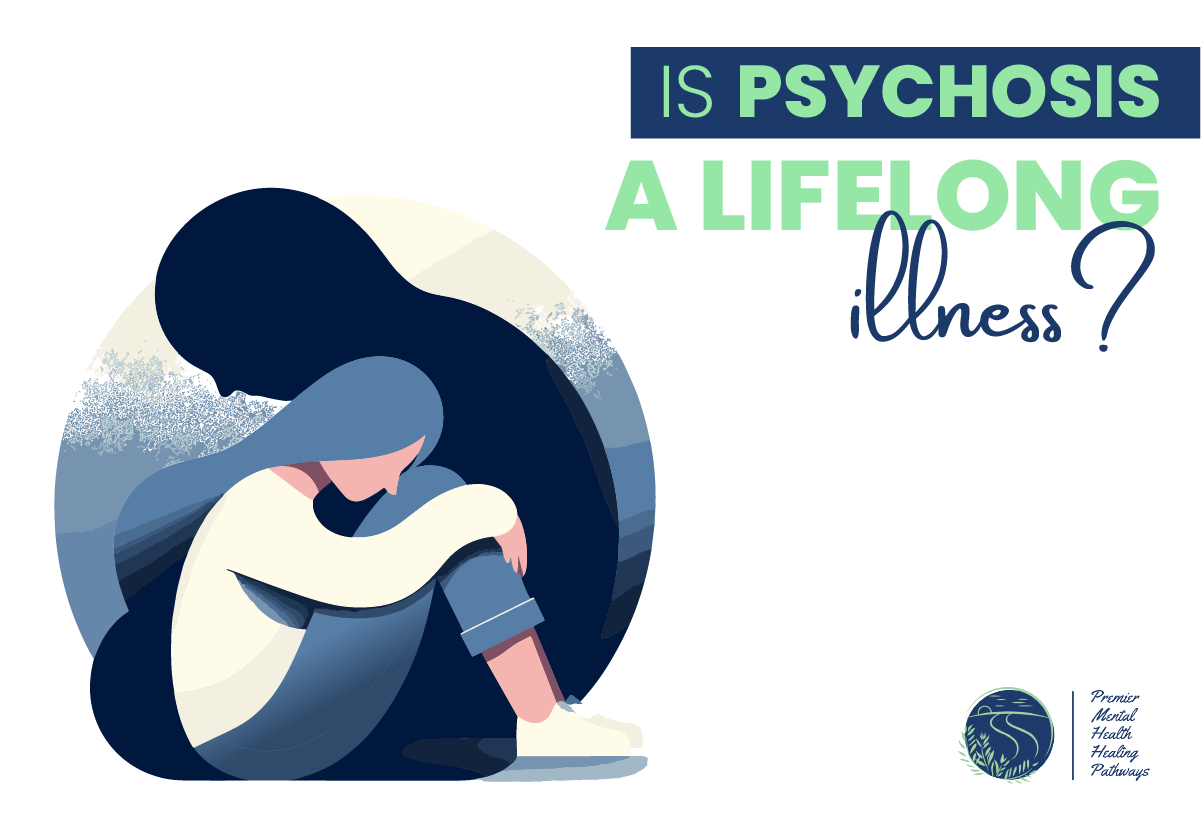Psychosis is a mental illness that causes people to lose touch with reality and often includes hallucinations, delusions, and chaotic thoughts.
Being diagnosed with it can be scary and hard for both the person who has it and their loved ones.
If you and your loved ones suffering from these diseases, you should consider Premier Mental Health Healing Pathways for your mental illness.
People often wonder is psychosis a lifelong illness?
Let us write more about this subject on our blog.
Understanding Psychosis
Before we talk about how long psychosis lasts, let us talk about what it is. To be clear, psychosis is not a separate disorder.
It is a sign of many others, like bipolar disorder, severe depression, schizophrenia, or schizoaffective disorder.
This can also happen if someone is abusing drugs, has a stroke, or has some other health problem.
Is Psychosis a Lifelong Illness?
Psychosis can last for a long or to be short with someone. For some people, psychosis is just a short-term episode that happens once in a while or not at all.
It is usually caused by stress, trauma, or drug use. In these cases, with proper treatment and support, individuals may fully recover and not experience psychosis again.
For some people, though, psychosis may be a part of a long-term mental illness, like schizophrenia or schizoaffective disorder.
In these situations, psychosis tends to happen again and again, and the person may need ongoing treatment and care.
Even though the symptoms may change over time, the underlying condition usually lasts a person’s whole life.
Elderly Psychosis Symptoms
What is the Most Common Cause of Psychosis in Elderly?
According to the NCBI, older people with neurological disorders often have behavior problems.
Patients with Parkinson’s disease, Huntington’s disease, multiple sclerosis, and amyotrophic lateral sclerosis may develop psychotic symptoms.
People with these symptoms may have hallucinations, delusions, and other issues that change the way they think and act.
These are the main symptoms of psychosis:
- Hallucinations: Hearing, seeing, tasting, smelling, or feeling things that do not exist outside of your mind are called hallucinations. For example, you might hear the voice of someone who is not there.
- Delusions: Delusions are false beliefs about things that are not true. For example, you might think someone wants to hurt or kill you, or you might think you have power, magical abilities, or authority that you do not really have.
- Confused and Disturbed Thoughts: Thoughts that make you feel confused or upset may make you speak quickly or change the subject of a conversation quickly.
You may also feel the following during psychosis:
- Impulsive behavior that is hasty or disorganized
- Negative signs, like not wanting to do normal things, looking messy, not following through with normal routines, or not showing emotion
- Catatonia, a condition in which you appear “frozen” and are unable to move or speak much
Premier Mental Health Healing Pathways can help you if you are dealing with psychosis.
How to Treat and Manage?
No matter if psychosis is a short-term episode or part of a long-term condition, getting help early and getting the right treatment are important for improving outcomes and quality of life. Here are some ways to treat:
- Medicines
People with psychosis and other mental health issues are often given antipsychotic drugs to help them deal with their symptoms. These medicines help people with hallucinations, delusions, and other symptoms deal with their daily lives better.
- Therapy
Cognitive-behavioral therapy (CBT) and supportive therapy are two types of psychotherapy that can help people with psychotic symptoms and stress deal with their problems, gain more insight, and get better.
- Supportive Services
Case management, vocational rehabilitation, and housing assistance are some of the supportive services that people with psychosis can use to keep their family, friends, and social connections.
- Lifestyle Changes
A healthy lifestyle includes regular exercise, getting enough sleep, learning how to deal with stress, and not using drugs. This can help with medical treatment and make your health better overall.
- Support and Education for the Family
Including family members and carers in planning treatment and providing education and support can help people understand, talk to each other, and give better care and support.
In conclusion, is psychosis a lifelong illness?
It depends a lot on the underlying cause, the person who is going through psychosis, and how long it lasts.
Some people have it as a short-term episode, and people have it as a long-term mental illness.
No matter what, getting help early and the proper treatment is essential for managing symptoms and improving life.
People with psychosis can deal with their conditions and live whole lives with the right help, such as medication, therapy, lifestyle changes, and involvement from their families.
To better handle psychosis, it is essential to get help from professionals like Premier Mental Health Healing Pathways if you or someone you care about is showing signs of it.
FAQs
Can you fully recover from psychosis?
Most people who have their first episode of psychosis will get better with good treatment, and they may never have another one. It is important to remember that psychosis can be treated, and if someone gets help early on, they might never have another episode.
Can psychosis go away on its own?
To get better after their first psychotic episode takes different amounts of time for each person.
After their symptoms go away, some people can go back to their normal lives right away.
Some people may not get better for weeks or months, and they may need help for longer.
Can anxiety lead to psychosis?
When someone has terrible anxiety, their anxiety can turn into psychosis symptoms.






No comment